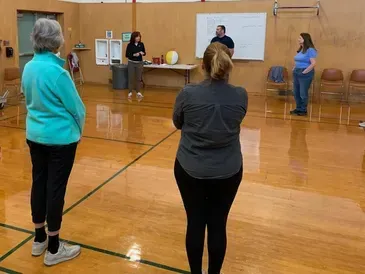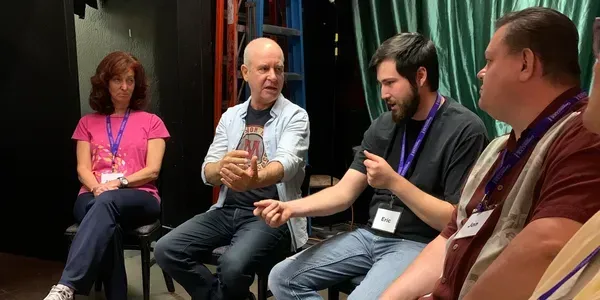WHAT IMPROV IS AS A TOOL

Improv can be a powerful tool for developing communication skills: Improv exercises and games can help people to develop their listening skills, become more comfortable with taking risks in social situations, and learn to be more present and engaged in conversations. These skills can be especially helpful for people who struggle with social anxiety or who have difficulty expressing themselves in group settings.

Improv can help people to build connections and form community: Improv classes and workshops can provide a space for people to connect with others who share their interests and challenges. By working together to develop their communication skills, participants can form bonds and develop a sense of belonging that can be hard to find in other social settings.

Improv can be used to address specific communication challenges: Spontaneous Mind can place focus on using improv to improve communication skills by tailoring their programs to address specific needs within their communities. For example, providing workshops for people with autism or other communication disorders, or for professionals who need to improve their public speaking skills

Improv exercises and games are often playful and lighthearted, which can make learning new communication skills feel less intimidating and more enjoyable. By making communication training more engaging and accessible, Spontaneous Mind can help people become more confident and effective communicators.
The Tenets of Improv

Yes, and
This is the core principle of improvisation. It involves accepting and building upon the ideas of others. In practice, this means saying "yes" to the suggestions of your scene partner and adding something new to the scene with the "and."
Listening
Improvisation requires active listening, which means being fully present in the moment and paying attention to what is happening around you. When you listen closely to your scene partner, you can respond in a way that builds upon what has been established and moves the scene forward.


Agreement
In order to create a successful scene, improvisers must agree on the basic facts and premises of the scene. This helps to establish a shared reality and allows for more creative exploration within the scene.
Character
Creating compelling characters is key to successful improv scenes. Characters should have clear objectives, relationships, and points of view that drive the action of the scene.


Status
Status refers to the relative power dynamic between characters in a scene. Understanding and playing with status can add depth and complexity to scenes and characters.
Physicality
Physicality can be a powerful tool in improvisation, allowing improvisers to create environments, objects, and characters through movement and gesture.


Storytelling
While improv scenes are often comedic, they can also be dramatic or poignant. Understanding the basics of storytelling, including plot structure, character development, and narrative tension, can help improvisers create more engaging and satisfying scenes.
FREQUENTLY ASKED QUESTIONS
Does Improv Have to Be Funny?
No, improv does not have to be funny. While many people associate improv with comedy and humor, it can also be used for dramatic, emotional, or even thought-provoking performances. Improv can be used to explore a wide range of subjects and emotions, and it can be tailored to the preferences and goals of the performers and audience. Ultimately, the style and tone of an improv performance depend on the intent and vision of the performers and the type of show they are creating.
How Do I Get Past My Fear of Performing or Being on the Spot?
As humans, we are wired to seek comfort and avoid discomfort. However, the path to growth and transformation often requires us to step outside of our comfort zone and embrace discomfort. At Spontaneous Mind, we will explore how to get comfortable with discomfort and use it as a catalyst for growth and transformation. A big part of that is creation of fun, safe supportive environment.
Can Improv Help My Business?
The foundation of any successful business relationship is trust. Whether you're working with clients, colleagues, or employees, building trust is essential to effective communication and collaboration. Improv activities are a powerful tool for building trust and improving team dynamics because they encourage participants to take risks, rely on each other, and be present in the moment.
COPYRIGHT ©2026 SPONTANEOUS MIND - ALL RIGHTS RESERVED.
